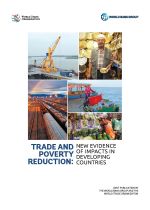
| UPCOMING EVENTS | |||
 |
Chapters in books
Trade and poverty reduction: New evidence of impacts in developing countries (2018)
The report,“Trade and Poverty Reduction: New Evidence of Impacts in Developing Countries”, was launched by WTO Director-General Roberto Azevêdo and World Bank Chief Economist Pinelopi Goldberg at the WTO in Geneva. It presents eight case studies showing how trade helps the extreme poor in the developing world, particularly those who live in conflict states, work in rural areas or in informal jobs, or are female. The country-specific approach of the new publication complements the global perspective in a previous joint report entitled "The Role of Trade in Ending Poverty" published by the two institutions in 2015.
"This report looks at the challenges the poorest face in joining global trade flows. It also highlights the fact that, in a scenario of heightened trade policy uncertainty, the poorest stand to lose the most," DG Azevêdo said in launching the publication. "In doing so, this publication gives governments food for thought on policies that could help maximize the overall positive gains of trade for the extreme poor. It also helps to highlight the importance of international cooperation to ensure that everybody can benefit."
Orkoh, E. 2018. Gender Welfare Effects of Regional Trade Integration on Households in Ghana in Trade and poverty reduction: New evidence of impacts in developing countries. Geneva: World Trade Organization,
Trade and poverty reduction: New evidence of impacts in developing countries
Gender Welfare Effects of Regional Trade Integration on Households in Ghana
How the G20 can help sustainably reshape the global trade system (2018)
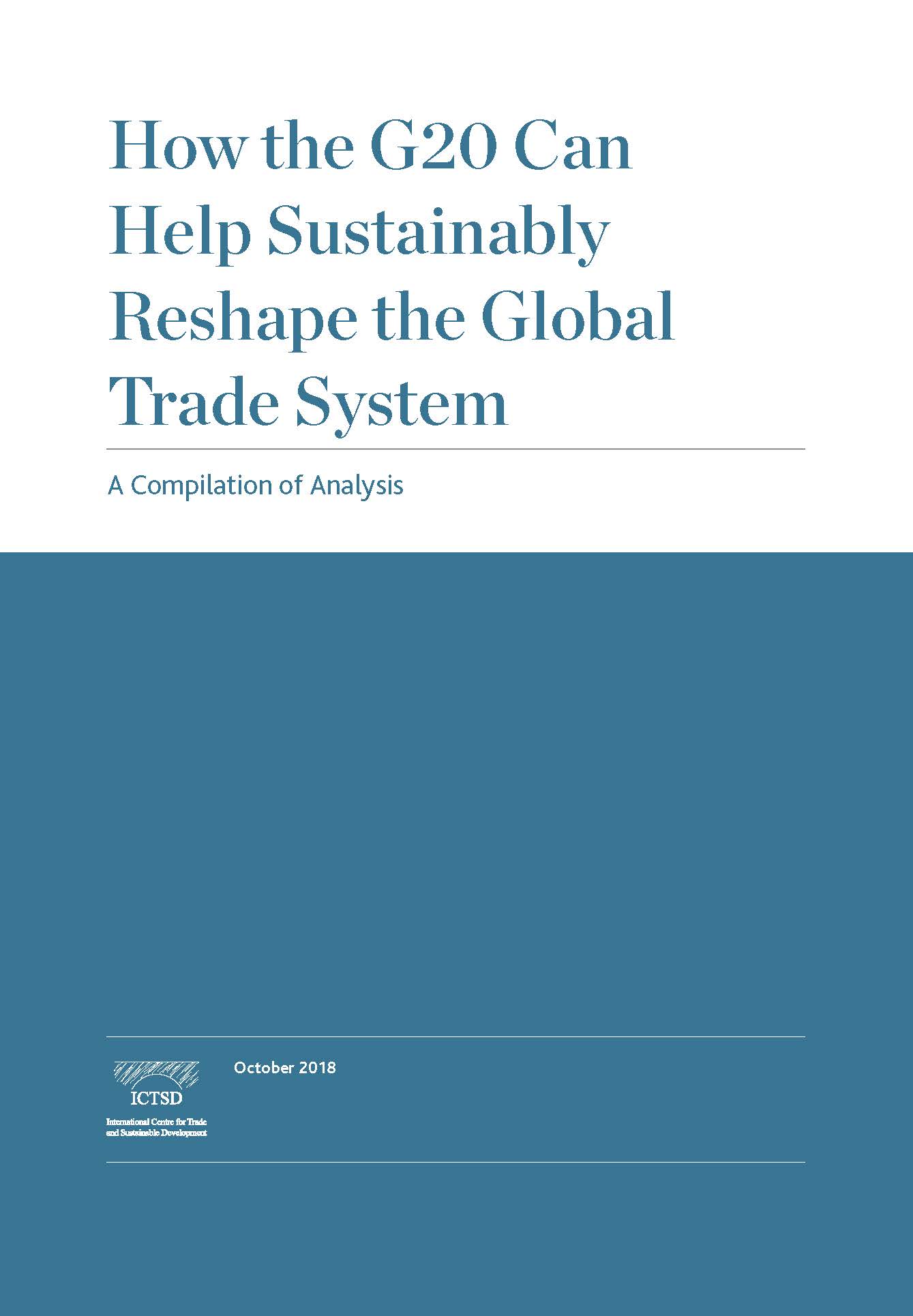 Gathering in Mar del Plata in September 2018, G20 trade and investment ministers agreed to “step up dialogue and actions to mitigate risks and enhance confidence in international trade.” The global trade and investment system is in need of such a boost. Trust in the multilateral trading system, for example, is diminishing as economic heavyweights increasingly apply trade measures and practices that undermine the principles and rules that underpin the World Trade Organization (WTO). In this context, and ahead of the 2018 Buenos Aires G20 Leaders Summit and the Japanese presidency in 2019, ICTSD has assembled a collection of short papers that explore how the G20 can help reshape the world trading system. The expert contributions provide inputs around sustainability and systemic concerns in trade-related policymaking and seek to enable leaders from G20 economies, as well as decision-makers and policy researchers around the globe, to identify and address key challenges that prevent the trade and investment system from being inclusive and sustainable.
Gathering in Mar del Plata in September 2018, G20 trade and investment ministers agreed to “step up dialogue and actions to mitigate risks and enhance confidence in international trade.” The global trade and investment system is in need of such a boost. Trust in the multilateral trading system, for example, is diminishing as economic heavyweights increasingly apply trade measures and practices that undermine the principles and rules that underpin the World Trade Organization (WTO). In this context, and ahead of the 2018 Buenos Aires G20 Leaders Summit and the Japanese presidency in 2019, ICTSD has assembled a collection of short papers that explore how the G20 can help reshape the world trading system. The expert contributions provide inputs around sustainability and systemic concerns in trade-related policymaking and seek to enable leaders from G20 economies, as well as decision-makers and policy researchers around the globe, to identify and address key challenges that prevent the trade and investment system from being inclusive and sustainable.
Parry, A., Viviers, W. & Jansen van Rensburg, S. 2018. Southern Africa and the Digital Challenge: how the G20 can influence a digital turnaround in the region in How the G20 can help sustainably reshape the global trade system: a compilation of analysis. Geneva: International Centre for Trade and Sustainable Development (ICTSD), pp. 121-129.
How the G20 can sustainably help reshape the global trade system: A compilation of analysis
Financing sustainable development in Africa (2018)
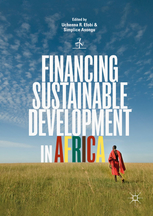 This edited volume provides a critical evaluation of financing options for sustainable development in Africa. While sustainability has long been the watchword for development programs, and while many African countries have taken initiatives to develop integrated frameworks that tackle developmental challenges—including poverty, education, and health—financing has remained a challenge. In this book, an expert team of chapter authors examines new financing options while also exploring how traditional financing means, such as foreign aid and foreign direct investment, can be more effective for sustainability. The authors discuss how African nations can build adequate structures and productive capacity to create a platform that can meet present economic, social, and environmental needs without compromising the ability of future generations to meet their own needs. Practical case studies and scientific evidence give this book a unique approach that is both qualitative and quantitative. This book will be of interest to students, practitioners, and scholars of development studies, public policy and African economics.
This edited volume provides a critical evaluation of financing options for sustainable development in Africa. While sustainability has long been the watchword for development programs, and while many African countries have taken initiatives to develop integrated frameworks that tackle developmental challenges—including poverty, education, and health—financing has remained a challenge. In this book, an expert team of chapter authors examines new financing options while also exploring how traditional financing means, such as foreign aid and foreign direct investment, can be more effective for sustainability. The authors discuss how African nations can build adequate structures and productive capacity to create a platform that can meet present economic, social, and environmental needs without compromising the ability of future generations to meet their own needs. Practical case studies and scientific evidence give this book a unique approach that is both qualitative and quantitative. This book will be of interest to students, practitioners, and scholars of development studies, public policy and African economics.
Efobi, U., Orkoh, E. & Atata, S. 2018. Financial inclusion and foreign market participation of firms: A quasi-experiment from Nigeria in Efobi, U. & Asongu, S. (eds.) Financing sustainable development in Africa, Zug-Switzerland: Palgrave Macmillan, pp. 39-61.
Financing sustainable development in Africa
Financial inclusion and foreign market participation of firms: A quasi-experiment from Nigeria
Non-tariff measures: Economic assessment and policy options for development (2018)
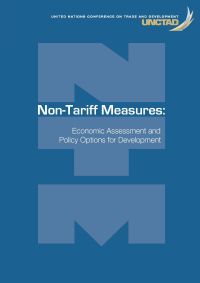 One of the main features of the international cooperation agenda during the last 50 years has been to promote the economic integration of poorer countries into the global economy, helping them to eradicate poverty and achieve prosperity. The rationale is that stronger economic integration will enhance economic growth, reduce poverty, and ultimately develop the resources needed for sustainable and inclusive prosperity. Although economic integration has been an integral part of the agenda for five decades, many countries still struggle to integrate into international markets. One problem is that contemporary economic integration strategies need to confront policy measures that are well beyond the scope of traditional trade policy.
One of the main features of the international cooperation agenda during the last 50 years has been to promote the economic integration of poorer countries into the global economy, helping them to eradicate poverty and achieve prosperity. The rationale is that stronger economic integration will enhance economic growth, reduce poverty, and ultimately develop the resources needed for sustainable and inclusive prosperity. Although economic integration has been an integral part of the agenda for five decades, many countries still struggle to integrate into international markets. One problem is that contemporary economic integration strategies need to confront policy measures that are well beyond the scope of traditional trade policy.
For example, developing countries’ effective participation in world markets depends on their capacity to satisfy technical and quality standards, as well as to comply with administrative procedures. As this book shows, all these policies measures, generally referred as non-tariff measures, have a profound impact on the structure of global trade and participation of countries therein. The fact-based contributions herein provide a solid overview of the evolving role of non-tariff measures in the multilateral policy framework and how these measures affect development strategies. The need for this publication is based on the belief that good policy needs to be backed by good analysis.
This publication provides an overview of analytical tools for the assessment of how non-tariff measures impact socio-economic development. It utilizes much needed case studies from researchers in developing countries.
Idsardi, E. & Viviers, W. 2018. Agricultural export patterns from Africa to the European Union: Exploring non-tariff measures, product relatedness, and market size in de Melo, J. & Nicita, A. (eds.) Non-tariff measures: Economic assessment and policy options for development. Geneva-Switzerland: United Nations Conference on Trade and Development (UNCTAD) Publications, pp. 289-325.
Non-tariff measures: Economic assessment and policy options for development
Trade costs and inclusive growth: Case studies presented by WTO chair-holders (2016)
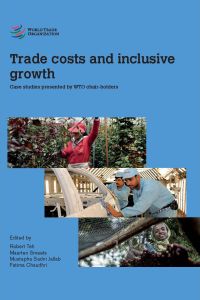 "Trade Costs and Inclusive Growth" looks at how implementation of the WTO’s Trade Facilitation Agreement (TFA) can help to reduce trade costs and promote growth. The publication brings together contributions from ten participants in the WTO Chairs Programme, which supports trade-related activities by academic institutions in developing countries.
"Trade Costs and Inclusive Growth" looks at how implementation of the WTO’s Trade Facilitation Agreement (TFA) can help to reduce trade costs and promote growth. The publication brings together contributions from ten participants in the WTO Chairs Programme, which supports trade-related activities by academic institutions in developing countries.
The book looks into how the Aid for Trade initiative can assist with implementing the TFA, the importance of mainstreaming trade into national development strategies, and the potential impact of the TFA in various regions.
Steenkamp, E., Grater, S. & Viviers, W. 2016. Streamlining South Africa's export development efforts in sub-Saharan Africa: A Decision Support Model approach, in Teh, R., Smeets, M., Sadni Jallab, M. & Chaudhri, F. (eds.) Trade costs and inclusive growth: Case studies presented by WTO chair-holders. Geneva-Switzerland: WTO Publications, pp. 49-82.
Trade costs and inclusive growth: Case studies presented by WTO chair-holders
Child Poverty, Youth (Un)Employment, and Social Inclusion (2016)
 Worldwide child and youth poverty remain the biggest barrier to achieving a better life in adulthood. Progress in lifting children out of poverty in the last decades has been slow and limited in the developing world, while the recent global economic crisis has exacerbated child poverty, youth unemployment, and social exclusion in many developed countries.
Worldwide child and youth poverty remain the biggest barrier to achieving a better life in adulthood. Progress in lifting children out of poverty in the last decades has been slow and limited in the developing world, while the recent global economic crisis has exacerbated child poverty, youth unemployment, and social exclusion in many developed countries.
This book critically examines the long-term consequences of growing up poor, the close linkages between deprivation and human rights violations in childhood and adolescence, and their effects on labor market entry and future career in a number of developing and developed countries. Drawing on multiple disciplinary perspectives, it makes a forceful case for the eradication of child poverty to take center stage in the Sustainable Development Goals.
Schenck, C.J., Blaauw, P.F. & Viljoen, J.M.N. 2016. “Generation Nowhere”: The youth in South Africa’s informal economy—the case of day laborers and waste pickers, in Petmesidou, M., Delamonica, E., Papatheodorou, C. & Henry-LeeChild, A. (eds.) Poverty, Youth (Un)Employment, and Social Inclusion. Stuttgart -Germany: Ibidem Verlag, pp. 243-271.
Povery, Youth (Un)Employment, and Social Inclusion
The performance of European business in the 20th Century (2016)
 This book is a first attempt at measuring European business performance over the entire twentieth century and in doing so provides a totally new approach to European business history. It is based on a single sample of 1,225 companies, belonging to eight European economies: the UK, France, Germany, Italy, Spain, Belgium, Sweden, and Finland. Performance has been measured in terms of return on equity (ROE) and holding return (HR), thus providing a complementary measure of profitability, the former from the firm’s perspective, the latter from the investor’s perspective. The book’s findings, at times surprising, at once confirm and challenge widely held assumptions regarding business performance—regarding strategy and structure, ownership and control, old and new industries, emerging and advanced economies.
This book is a first attempt at measuring European business performance over the entire twentieth century and in doing so provides a totally new approach to European business history. It is based on a single sample of 1,225 companies, belonging to eight European economies: the UK, France, Germany, Italy, Spain, Belgium, Sweden, and Finland. Performance has been measured in terms of return on equity (ROE) and holding return (HR), thus providing a complementary measure of profitability, the former from the firm’s perspective, the latter from the investor’s perspective. The book’s findings, at times surprising, at once confirm and challenge widely held assumptions regarding business performance—regarding strategy and structure, ownership and control, old and new industries, emerging and advanced economies.
Buelens, F., Cuyvers, L., Deloof, M. & De Smedt, H. 2012. The performance of Belgian Enterprises in the Twentieth Century, in Y. Cassis (eds.) The performance of European business in the 20th Century. Oxford: Oxford University Press, pp.55-71.
Pierenkemper, T., De Smedt, H., Buelens, F., Cuyvers, L., Deloof, M. 2016. Old Industries in Europe, 1911–2000, in Y. Cassis (eds.) The performance of European business in the 20th Century. Oxford: Oxford University Press, pp. 171-189.
The performance of European Business in the Twentieth Century
The performance of Belgian Enterprises in the Twentieth Century
Old Industries in Europe, 1911-2000
Private standards and global governance - economic, legal and political perspectives (2012)
 Private regulatory initiatives aim to govern supply chains across the globe according to a set of environmental, food safety and/or social standards. Until now, literature on the topic has been fragmented and divided by research fields. However, this unique and comprehensive book bridges these disciplinary and thematic research lines, bringing together an interdisciplinary group of leading scholars to identify key issues.
Private regulatory initiatives aim to govern supply chains across the globe according to a set of environmental, food safety and/or social standards. Until now, literature on the topic has been fragmented and divided by research fields. However, this unique and comprehensive book bridges these disciplinary and thematic research lines, bringing together an interdisciplinary group of leading scholars to identify key issues.
The expert contributors assess the state-of-the-art with regard to private regulation of food, natural resources and labour conditions. They begin with an introduction to, and discussion of, several leading existing private standards, and go on to assess private food standards and their legitimacy and effectiveness in the context of the global trade regime.
This truly multidisciplinary assessment of the scope and importance of private standards as a governance tool in a globalising world will prove to be an enlightening read for a wide-ranging audience encompassing: academics, students, researchers, policymakers and analysts focusing on private forms of governance in several sectors including economics, law, politics, development, environment and agriculture.
Cuyvers, L. & De Meyer, T. 2012. Market‐driven promotion of international labour standards in southeast‐Asia – the corporatization of social justice, in J. Swinnen, J. Wouters, M. Maertens and A. Marx (eds.), Private standards and global governance - economic, legal and political perspectives. Cheltenham-Northampton: Edward Elgar Publ. Ltd, pp. 114-149.
Private standards and global governance - Economic, legal and political perspectives
Export promotion: A decision support model approach (2012)
 Governments are increasingly confronted by scarce resources, which force their export promotion organisations to seek more efficient ways of carrying out their mandates. Notwithstanding the export successes of several emerging economies, public export promotion policies of countries are generally facing diminishing returns, particularly where the traditional export promotion instruments are used.
Governments are increasingly confronted by scarce resources, which force their export promotion organisations to seek more efficient ways of carrying out their mandates. Notwithstanding the export successes of several emerging economies, public export promotion policies of countries are generally facing diminishing returns, particularly where the traditional export promotion instruments are used.
The DSM (Decision Support Model) approach to export promotion, which is introduced and explained in the book, is deeply rooted in the international marketing research literature and allows for the identification, in the rapidly changing international environment, of the most promising realistic export opportunities for those looking to expand their reach.
The various chapters explain the DSM approach in detail and offer the most recent results for three countries: Belgium, South Africa and Thailand. They further elaborate on more recent developments and applications, such as the identification of export opportunities for services (as distinct from products), and the use of DSM results to assess traditional export promotion programmes and to guide the formulation of new export promotion strategies at product level. Why and how the identified DSM export opportunities should be supplemented with competitive intelligence conducted by export promotion organisations and support structures, is also discussed.
Cuyvers, L. 2012. The political economy of public export promotion: The case of the Flemish region, Belgium; in L. Cuyvers & W. Viviers (eds.) Export promotion: A decision support model approach. Stellenbosch: Sun Media, pp. 11-28.
Cuyvers, L., Steenkamp, E. & Viviers, W. 2012. The methodology of the decision support model (DSM), Overview of international market selection methods; in L. Cuyvers & W. Viviers (eds.) Export promotion: A decision support model approach. Stellenbosch: Sun Media, pp. 57-86.
Cuyvers, L., Steenkamp, E. & Viviers, W. 2012. Belgium’s export opportunities and export potentials in the world: A quantitative assessment using the DSM approach; in L. Cuyvers & W. Viviers (eds.) Export promotion: A decision support model approach. Stellenbosch: Sun Media, pp. 87-112.
Cuyvers, L., Steenkamp, E.A., Viviers, W. & Rossouw, R. 2012. Realistic export opportunities and export potentials: A comparison using DSM results for Belgium, South Africa and Thailand; in L. Cuyvers & W. Viviers (eds.) Export promotion: A decision support model approach. Stellenbosch: Sun Media Metro. Chapter 6, pp. 109-130.
Steenkamp, E. & Viviers, W. 2012. The identification of export opportunities for South Africa in the rest of the African content; in L. Cuyvers & W. Viviers (eds.) Export promotion: A decision support model approach. Stellenbosch: Sun Media, pp. 137-162.
Cuyvers, L. & Dumont, M. 2012. The assessment of public export activities using DSM results: the case of Belgium; in L. Cuyvers & W. Viviers (eds.) Export promotion: A decision support model approach. Stellenbosch: Sun Media, pp. 165-190.
Cuyvers, L., Viviers, W., Sithole-Pisa, N. & Kühn, M.L. 2012. Developing strategies for export promotion using a decision support model; South African case studies; in L. Cuyvers & W. Viviers (eds.) Export promotion: A decision support model approach. Stellenbosch: Sun Media, pp. 191-210.
Grater, S. & Viviers, W. 2012. Adaptation and application of the DSM for services in South Africa; in L. Cuyvers & W. Viviers (eds.) Export promotion: A decision support model approach. Stellenbosch: Sun Media, pp. 213-236.
Kühn, M.L. & Viviers, W. 2012. Exporters’ information requirements: competitive intelligence as an export promotion instrument; in L. Cuyvers & W. Viviers (eds.) Export promotion: a decision support model approach. Stellenbosch: Sun Media, pp. 237- 262.
Export promotion: a decision support model approach (extract and introduction)
Export promotion: a decision support model approach (purchase information for hardcopy and ebook)
Chapters in books
Trade and poverty reduction: New evidence of impacts in developing countries (2018)
The report,“Trade and Poverty Reduction: New Evidence of Impacts in Developing Countries”, was launched by WTO Director-General Roberto Azevêdo and World Bank Chief Economist Pinelopi Goldberg at the WTO in Geneva. It presents eight case studies showing how trade helps the extreme poor in the developing world, particularly those who live in conflict states, work in rural areas or in informal jobs, or are female. The country-specific approach of the new publication complements the global perspective in a previous joint report entitled "The Role of Trade in Ending Poverty" published by the two institutions in 2015.
"This report looks at the challenges the poorest face in joining global trade flows. It also highlights the fact that, in a scenario of heightened trade policy uncertainty, the poorest stand to lose the most," DG Azevêdo said in launching the publication. "In doing so, this publication gives governments food for thought on policies that could help maximize the overall positive gains of trade for the extreme poor. It also helps to highlight the importance of international cooperation to ensure that everybody can benefit."
Orkoh, E. 2018. Gender Welfare Effects of Regional Trade Integration on Households in Ghana in Trade and poverty reduction: New evidence of impacts in developing countries. Geneva: World Trade Organization,
Trade and poverty reduction: New evidence of impacts in developing countries
Gender Welfare Effects of Regional Trade Integration on Households in Ghana
How the G20 can help sustainably reshape the global trade system (2018)
 Gathering in Mar del Plata in September 2018, G20 trade and investment ministers agreed to “step up dialogue and actions to mitigate risks and enhance confidence in international trade.” The global trade and investment system is in need of such a boost. Trust in the multilateral trading system, for example, is diminishing as economic heavyweights increasingly apply trade measures and practices that undermine the principles and rules that underpin the World Trade Organization (WTO). In this context, and ahead of the 2018 Buenos Aires G20 Leaders Summit and the Japanese presidency in 2019, ICTSD has assembled a collection of short papers that explore how the G20 can help reshape the world trading system. The expert contributions provide inputs around sustainability and systemic concerns in trade-related policymaking and seek to enable leaders from G20 economies, as well as decision-makers and policy researchers around the globe, to identify and address key challenges that prevent the trade and investment system from being inclusive and sustainable.
Gathering in Mar del Plata in September 2018, G20 trade and investment ministers agreed to “step up dialogue and actions to mitigate risks and enhance confidence in international trade.” The global trade and investment system is in need of such a boost. Trust in the multilateral trading system, for example, is diminishing as economic heavyweights increasingly apply trade measures and practices that undermine the principles and rules that underpin the World Trade Organization (WTO). In this context, and ahead of the 2018 Buenos Aires G20 Leaders Summit and the Japanese presidency in 2019, ICTSD has assembled a collection of short papers that explore how the G20 can help reshape the world trading system. The expert contributions provide inputs around sustainability and systemic concerns in trade-related policymaking and seek to enable leaders from G20 economies, as well as decision-makers and policy researchers around the globe, to identify and address key challenges that prevent the trade and investment system from being inclusive and sustainable.
Parry, A., Viviers, W. & Jansen van Rensburg, S. 2018. Southern Africa and the Digital Challenge: how the G20 can influence a digital turnaround in the region in How the G20 can help sustainably reshape the global trade system: a compilation of analysis. Geneva: International Centre for Trade and Sustainable Development (ICTSD), pp. 121-129.
How the G20 can sustainably help reshape the global trade system: A compilation of analysis
Financing sustainable development in Africa (2018)
 This edited volume provides a critical evaluation of financing options for sustainable development in Africa. While sustainability has long been the watchword for development programs, and while many African countries have taken initiatives to develop integrated frameworks that tackle developmental challenges—including poverty, education, and health—financing has remained a challenge. In this book, an expert team of chapter authors examines new financing options while also exploring how traditional financing means, such as foreign aid and foreign direct investment, can be more effective for sustainability. The authors discuss how African nations can build adequate structures and productive capacity to create a platform that can meet present economic, social, and environmental needs without compromising the ability of future generations to meet their own needs. Practical case studies and scientific evidence give this book a unique approach that is both qualitative and quantitative. This book will be of interest to students, practitioners, and scholars of development studies, public policy and African economics.
This edited volume provides a critical evaluation of financing options for sustainable development in Africa. While sustainability has long been the watchword for development programs, and while many African countries have taken initiatives to develop integrated frameworks that tackle developmental challenges—including poverty, education, and health—financing has remained a challenge. In this book, an expert team of chapter authors examines new financing options while also exploring how traditional financing means, such as foreign aid and foreign direct investment, can be more effective for sustainability. The authors discuss how African nations can build adequate structures and productive capacity to create a platform that can meet present economic, social, and environmental needs without compromising the ability of future generations to meet their own needs. Practical case studies and scientific evidence give this book a unique approach that is both qualitative and quantitative. This book will be of interest to students, practitioners, and scholars of development studies, public policy and African economics.
Efobi, U., Orkoh, E. & Atata, S. 2018. Financial inclusion and foreign market participation of firms: A quasi-experiment from Nigeria in Efobi, U. & Asongu, S. (eds.) Financing sustainable development in Africa, Zug-Switzerland: Palgrave Macmillan, pp. 39-61.
Financing sustainable development in Africa
Financial inclusion and foreign market participation of firms: A quasi-experiment from Nigeria
Non-tariff measures: Economic assessment and policy options for development (2018)
 One of the main features of the international cooperation agenda during the last 50 years has been to promote the economic integration of poorer countries into the global economy, helping them to eradicate poverty and achieve prosperity. The rationale is that stronger economic integration will enhance economic growth, reduce poverty, and ultimately develop the resources needed for sustainable and inclusive prosperity. Although economic integration has been an integral part of the agenda for five decades, many countries still struggle to integrate into international markets. One problem is that contemporary economic integration strategies need to confront policy measures that are well beyond the scope of traditional trade policy.
One of the main features of the international cooperation agenda during the last 50 years has been to promote the economic integration of poorer countries into the global economy, helping them to eradicate poverty and achieve prosperity. The rationale is that stronger economic integration will enhance economic growth, reduce poverty, and ultimately develop the resources needed for sustainable and inclusive prosperity. Although economic integration has been an integral part of the agenda for five decades, many countries still struggle to integrate into international markets. One problem is that contemporary economic integration strategies need to confront policy measures that are well beyond the scope of traditional trade policy.
For example, developing countries’ effective participation in world markets depends on their capacity to satisfy technical and quality standards, as well as to comply with administrative procedures. As this book shows, all these policies measures, generally referred as non-tariff measures, have a profound impact on the structure of global trade and participation of countries therein. The fact-based contributions herein provide a solid overview of the evolving role of non-tariff measures in the multilateral policy framework and how these measures affect development strategies. The need for this publication is based on the belief that good policy needs to be backed by good analysis.
This publication provides an overview of analytical tools for the assessment of how non-tariff measures impact socio-economic development. It utilizes much needed case studies from researchers in developing countries.
Idsardi, E. & Viviers, W. 2018. Agricultural export patterns from Africa to the European Union: Exploring non-tariff measures, product relatedness, and market size in de Melo, J. & Nicita, A. (eds.) Non-tariff measures: Economic assessment and policy options for development. Geneva-Switzerland: United Nations Conference on Trade and Development (UNCTAD) Publications, pp. 289-325.
Non-tariff measures: Economic assessment and policy options for development
Trade costs and inclusive growth: Case studies presented by WTO chair-holders (2016)
 "Trade Costs and Inclusive Growth" looks at how implementation of the WTO’s Trade Facilitation Agreement (TFA) can help to reduce trade costs and promote growth. The publication brings together contributions from ten participants in the WTO Chairs Programme, which supports trade-related activities by academic institutions in developing countries.
"Trade Costs and Inclusive Growth" looks at how implementation of the WTO’s Trade Facilitation Agreement (TFA) can help to reduce trade costs and promote growth. The publication brings together contributions from ten participants in the WTO Chairs Programme, which supports trade-related activities by academic institutions in developing countries.
The book looks into how the Aid for Trade initiative can assist with implementing the TFA, the importance of mainstreaming trade into national development strategies, and the potential impact of the TFA in various regions.
Steenkamp, E., Grater, S. & Viviers, W. 2016. Streamlining South Africa's export development efforts in sub-Saharan Africa: A Decision Support Model approach, in Teh, R., Smeets, M., Sadni Jallab, M. & Chaudhri, F. (eds.) Trade costs and inclusive growth: Case studies presented by WTO chair-holders. Geneva-Switzerland: WTO Publications, pp. 49-82.
Trade costs and inclusive growth: Case studies presented by WTO chair-holders
Child Poverty, Youth (Un)Employment, and Social Inclusion (2016)
 Worldwide child and youth poverty remain the biggest barrier to achieving a better life in adulthood. Progress in lifting children out of poverty in the last decades has been slow and limited in the developing world, while the recent global economic crisis has exacerbated child poverty, youth unemployment, and social exclusion in many developed countries.
Worldwide child and youth poverty remain the biggest barrier to achieving a better life in adulthood. Progress in lifting children out of poverty in the last decades has been slow and limited in the developing world, while the recent global economic crisis has exacerbated child poverty, youth unemployment, and social exclusion in many developed countries.
This book critically examines the long-term consequences of growing up poor, the close linkages between deprivation and human rights violations in childhood and adolescence, and their effects on labor market entry and future career in a number of developing and developed countries. Drawing on multiple disciplinary perspectives, it makes a forceful case for the eradication of child poverty to take center stage in the Sustainable Development Goals.
Schenck, C.J., Blaauw, P.F. & Viljoen, J.M.N. 2016. “Generation Nowhere”: The youth in South Africa’s informal economy—the case of day laborers and waste pickers, in Petmesidou, M., Delamonica, E., Papatheodorou, C. & Henry-LeeChild, A. (eds.) Poverty, Youth (Un)Employment, and Social Inclusion. Stuttgart -Germany: Ibidem Verlag, pp. 243-271.
Povery, Youth (Un)Employment, and Social Inclusion
The performance of European business in the 20th Century (2016)
 This book is a first attempt at measuring European business performance over the entire twentieth century and in doing so provides a totally new approach to European business history. It is based on a single sample of 1,225 companies, belonging to eight European economies: the UK, France, Germany, Italy, Spain, Belgium, Sweden, and Finland. Performance has been measured in terms of return on equity (ROE) and holding return (HR), thus providing a complementary measure of profitability, the former from the firm’s perspective, the latter from the investor’s perspective. The book’s findings, at times surprising, at once confirm and challenge widely held assumptions regarding business performance—regarding strategy and structure, ownership and control, old and new industries, emerging and advanced economies.
This book is a first attempt at measuring European business performance over the entire twentieth century and in doing so provides a totally new approach to European business history. It is based on a single sample of 1,225 companies, belonging to eight European economies: the UK, France, Germany, Italy, Spain, Belgium, Sweden, and Finland. Performance has been measured in terms of return on equity (ROE) and holding return (HR), thus providing a complementary measure of profitability, the former from the firm’s perspective, the latter from the investor’s perspective. The book’s findings, at times surprising, at once confirm and challenge widely held assumptions regarding business performance—regarding strategy and structure, ownership and control, old and new industries, emerging and advanced economies.
Buelens, F., Cuyvers, L., Deloof, M. & De Smedt, H. 2012. The performance of Belgian Enterprises in the Twentieth Century, in Y. Cassis (eds.) The performance of European business in the 20th Century. Oxford: Oxford University Press, pp.55-71.
Pierenkemper, T., De Smedt, H., Buelens, F., Cuyvers, L., Deloof, M. 2016. Old Industries in Europe, 1911–2000, in Y. Cassis (eds.) The performance of European business in the 20th Century. Oxford: Oxford University Press, pp. 171-189.
The performance of European Business in the Twentieth Century
The performance of Belgian Enterprises in the Twentieth Century
Old Industries in Europe, 1911-2000
Private standards and global governance - economic, legal and political perspectives (2012)
 Private regulatory initiatives aim to govern supply chains across the globe according to a set of environmental, food safety and/or social standards. Until now, literature on the topic has been fragmented and divided by research fields. However, this unique and comprehensive book bridges these disciplinary and thematic research lines, bringing together an interdisciplinary group of leading scholars to identify key issues.
Private regulatory initiatives aim to govern supply chains across the globe according to a set of environmental, food safety and/or social standards. Until now, literature on the topic has been fragmented and divided by research fields. However, this unique and comprehensive book bridges these disciplinary and thematic research lines, bringing together an interdisciplinary group of leading scholars to identify key issues.
The expert contributors assess the state-of-the-art with regard to private regulation of food, natural resources and labour conditions. They begin with an introduction to, and discussion of, several leading existing private standards, and go on to assess private food standards and their legitimacy and effectiveness in the context of the global trade regime.
This truly multidisciplinary assessment of the scope and importance of private standards as a governance tool in a globalising world will prove to be an enlightening read for a wide-ranging audience encompassing: academics, students, researchers, policymakers and analysts focusing on private forms of governance in several sectors including economics, law, politics, development, environment and agriculture.
Cuyvers, L. & De Meyer, T. 2012. Market‐driven promotion of international labour standards in southeast‐Asia – the corporatization of social justice, in J. Swinnen, J. Wouters, M. Maertens and A. Marx (eds.), Private standards and global governance - economic, legal and political perspectives. Cheltenham-Northampton: Edward Elgar Publ. Ltd, pp. 114-149.
Private standards and global governance - Economic, legal and political perspectives
Export promotion: A decision support model approach (2012)
 Governments are increasingly confronted by scarce resources, which force their export promotion organisations to seek more efficient ways of carrying out their mandates. Notwithstanding the export successes of several emerging economies, public export promotion policies of countries are generally facing diminishing returns, particularly where the traditional export promotion instruments are used.
Governments are increasingly confronted by scarce resources, which force their export promotion organisations to seek more efficient ways of carrying out their mandates. Notwithstanding the export successes of several emerging economies, public export promotion policies of countries are generally facing diminishing returns, particularly where the traditional export promotion instruments are used.
The DSM (Decision Support Model) approach to export promotion, which is introduced and explained in the book, is deeply rooted in the international marketing research literature and allows for the identification, in the rapidly changing international environment, of the most promising realistic export opportunities for those looking to expand their reach.
The various chapters explain the DSM approach in detail and offer the most recent results for three countries: Belgium, South Africa and Thailand. They further elaborate on more recent developments and applications, such as the identification of export opportunities for services (as distinct from products), and the use of DSM results to assess traditional export promotion programmes and to guide the formulation of new export promotion strategies at product level. Why and how the identified DSM export opportunities should be supplemented with competitive intelligence conducted by export promotion organisations and support structures, is also discussed.
Cuyvers, L. 2012. The political economy of public export promotion: The case of the Flemish region, Belgium; in L. Cuyvers & W. Viviers (eds.) Export promotion: A decision support model approach. Stellenbosch: Sun Media, pp. 11-28.
Cuyvers, L., Steenkamp, E. & Viviers, W. 2012. The methodology of the decision support model (DSM), Overview of international market selection methods; in L. Cuyvers & W. Viviers (eds.) Export promotion: A decision support model approach. Stellenbosch: Sun Media, pp. 57-86.
Cuyvers, L., Steenkamp, E. & Viviers, W. 2012. Belgium’s export opportunities and export potentials in the world: A quantitative assessment using the DSM approach; in L. Cuyvers & W. Viviers (eds.) Export promotion: A decision support model approach. Stellenbosch: Sun Media, pp. 87-112.
Cuyvers, L., Steenkamp, E.A., Viviers, W. & Rossouw, R. 2012. Realistic export opportunities and export potentials: A comparison using DSM results for Belgium, South Africa and Thailand; in L. Cuyvers & W. Viviers (eds.) Export promotion: A decision support model approach. Stellenbosch: Sun Media Metro. Chapter 6, pp. 109-130.
Steenkamp, E. & Viviers, W. 2012. The identification of export opportunities for South Africa in the rest of the African content; in L. Cuyvers & W. Viviers (eds.) Export promotion: A decision support model approach. Stellenbosch: Sun Media, pp. 137-162.
Cuyvers, L. & Dumont, M. 2012. The assessment of public export activities using DSM results: the case of Belgium; in L. Cuyvers & W. Viviers (eds.) Export promotion: A decision support model approach. Stellenbosch: Sun Media, pp. 165-190.
Cuyvers, L., Viviers, W., Sithole-Pisa, N. & Kühn, M.L. 2012. Developing strategies for export promotion using a decision support model; South African case studies; in L. Cuyvers & W. Viviers (eds.) Export promotion: A decision support model approach. Stellenbosch: Sun Media, pp. 191-210.
Grater, S. & Viviers, W. 2012. Adaptation and application of the DSM for services in South Africa; in L. Cuyvers & W. Viviers (eds.) Export promotion: A decision support model approach. Stellenbosch: Sun Media, pp. 213-236.
Kühn, M.L. & Viviers, W. 2012. Exporters’ information requirements: competitive intelligence as an export promotion instrument; in L. Cuyvers & W. Viviers (eds.) Export promotion: a decision support model approach. Stellenbosch: Sun Media, pp. 237- 262.
Export promotion: a decision support model approach (extract and introduction)
Export promotion: a decision support model approach (purchase information for hardcopy and ebook)
Chapters in books

